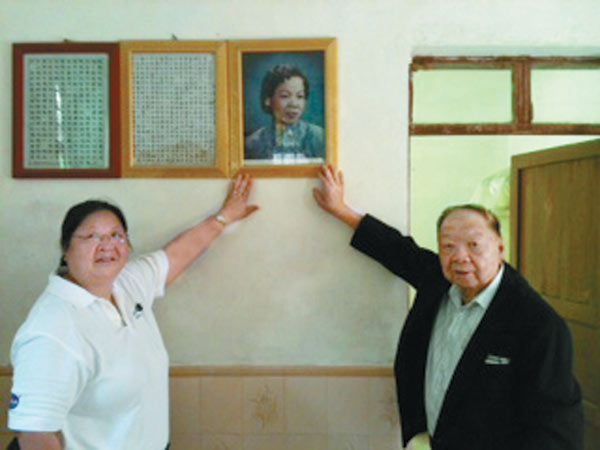I love you, really
Updated: 2013-01-20 07:53
By Tiffany Tan (China Daily)
|
||||||||
Meanwhile, overseas Chinese are still influenced by the norms of their native land. That includes those in the United States, where families usually say "I love you" to each other regularly.
 |
|
Soi Chong Powell and her dad John Chong visit his ancestral home in Guangdong province in 2012. The photo on the wall is of Powell's mother Lai Wah Seto Chong, who died in 2007. [Photo provided to China Daily] |
Fiona Lee, a 32-year-old California resident whose parents hail from Guangdong province, says her parents use English whenever they say "I love you" - although their first language is Cantonese.
"My theory about this is that, although in Chinese culture you don't really say it, American culture is more permissive and open, so English is the language we use to express deep feelings," she says.
Soi Chong Powell, 54, whose family moved from Hong Kong to the US Midwest in the 1950s, says she doesn't remember her parents telling her and three siblings "I love you" until they had left for college.
But since their mother died several years ago, she says, her family has been saying it to each other more often.
"We probably still don't say the words as much as our non-Asian friends," Powell says. "I'd like to think that I show my love by spending time with my dad and seeing to his well-being, like asking my cousin to set up his TV with a streaming box so he can watch Cantonese TV."
The "cultural revolution" (1966-76) also contributed in maintaining the status quo on declarations of love. It fully developed the collectivism and hierarchy of the traditional Chinese culture to the extent that personal interests, emotional desires and traits should be subdued to the collective needs, such as the work unit, village, society, Party or nation, says Ji Yingchun, a research fellow at the National University of Singapore's Asia Research Institute.
But with economic development and globalization, some Chinese are now becoming more vocal about tender feelings.
Meiyan, a Beijing housewife and part-time worker, who declined to give her full name to protect her privacy, says "I love you" to her daughter almost every day. She has also taught the 6-year-old to say the words back.
The 32-year-old mother says she has never spoken those three words to her parents, although she sometimes wants to. But her parents, farmers in Hebei province, would not understand why she's saying it and might think something is wrong.
So instead, she is empowering the next generation with the words.
"She will be able to say what is in her heart," Meiyan says.
And how often does she tell her husband "I love you"? "Rarely," she says. "And I never say the words first."
Certain cultures, families and couples do have their own language of love. Hundreds of millions of Chinese speak theirs every day.
Contact the writer at tiffany@chinadaily.com.cn.
Sun Ye contributed to this report.

 Li Na on Time cover, makes influential 100 list
Li Na on Time cover, makes influential 100 list
 FBI releases photos of 2 Boston bombings suspects
FBI releases photos of 2 Boston bombings suspects
 World's wackiest hairstyles
World's wackiest hairstyles
 Sandstorms strike Northwest China
Sandstorms strike Northwest China
 Never-seen photos of Madonna on display
Never-seen photos of Madonna on display
 H7N9 outbreak linked to waterfowl migration
H7N9 outbreak linked to waterfowl migration
 Dozens feared dead in Texas plant blast
Dozens feared dead in Texas plant blast
 Venezuelan court rules out manual votes counting
Venezuelan court rules out manual votes counting
Most Viewed
Editor's Picks

|

|

|

|

|

|
Today's Top News
Boston bombing suspect reported cornered on boat
7.0-magnitude quake hits Sichuan
Cross-talk artist helps to spread the word
'Green' awareness levels drop in Beijing
Palace Museum spruces up
First couple on Time's list of most influential
H7N9 flu transmission studied
Trading channels 'need to broaden'
US Weekly

|

|







